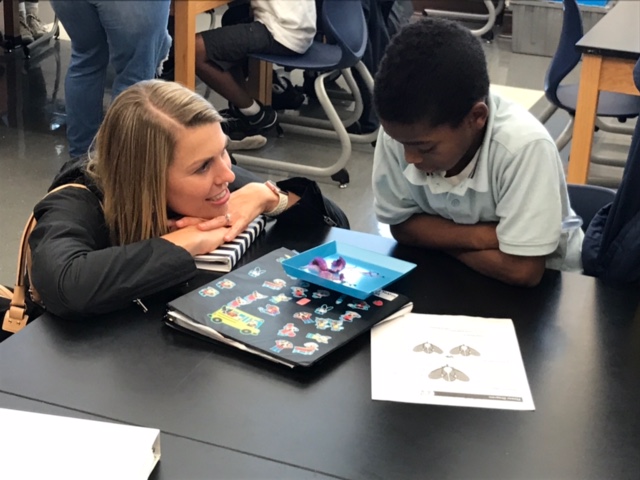Sowing seeds of Elementary Education

Course: EDEC 330: Math/Science Block-Early Childhood Education
Faculty: Lauren Angelone, Ph.D.; Debora Lou Kuchey, Ph.D.
Partner: Rothenberg Elementary and Rothenberg Gardens
Sowing seeds of Elementary Education
There is a garden growing on the roof of Rothenberg Elementary, and with every inch that the plants grow, so too do the seeds of knowledge in the students learning in the building beneath. In Lauren Angelone’s education class, she is helping future teachers learn the best methods to nurture the kids who will become the future.
One of the ways that Angelone is able to do this is through the partnership her course has with Rothenberg Preparatory Academy in Over-the-Rhine and the Rothenberg Rooftop Garden, a non-profit that works in collaboration with the elementary school to engage the students and neighborhood families in garden activities and skill-building.
Angelone’s course focuses on science for early childhood education, so she is used to planning classes that get the students hands in the dirt. In this course, her students did that in an authentic context to help her Xavier students learn how to best practice teaching the students at Rothenberg.
“Because I want to encourage my students to use authentic inquiry, so instead of planting a marigold in a cup, let’s see what happens in a real garden, the cycles of the year in a real garden,” Angelone said.
To get the authentic inquiry going, Angelone and her students traveled to the rooftop garden to teach a lesson on plants in a less intensive context than they typically would, giving them the opportunity to practice teaching in a one-on-one environment.
“It’s a different context than what they’re used to and that’s what I wanted them to see,” Angelone said. “It was a good scaffolding for them to be trying out these things with kids with me there right after I taught it and then graduating to (teaching it on their own) without me there, trying things without direct and in the moment feedback.”
Angelone believed that the experience was important because it was an opportunity to sow seeds of good educational praxis before her students enter the real world of education.
“The reason that it was important for me to do was because I thought it would be helpful for them to get some practice teaching kids before they went and taught kids,” Angelone said. “Usually we practice on one another, so they do a peer lesson, and I thought it would be helpful for them to do it and get feedback with real second graders and all the things that come along with teaching real second graders, and also so they could apply quicker.”
Additionally, this partnership allowed for her students to not only take part in an authentic inquiry, but also to participate in the authentic context of the school, helping them practice culturally relevant pedagogies.
“We spent an hour each time working with the kids, practicing teaching science in an authentic context and then reflecting on that experience in an authentic context in a garden,” Angelone said. “We were thinking really in particular how to teach these students and then connect.”